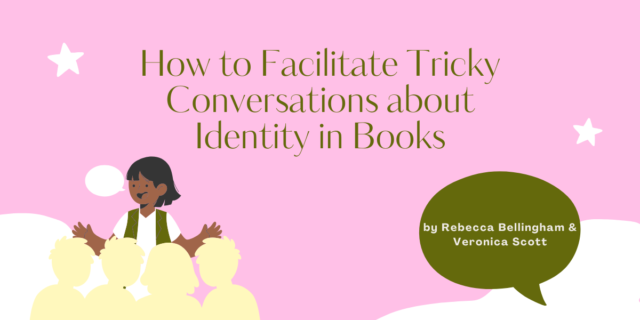
The Following excerpt is from Start Here, Start Now: A Guide to Antibias and Antiracist Work in Your School Community.
One of my former school’s operating norms for staff is “use your airplane mask,” meaning you have to be able to take care of yourself before you can take care of others (especially children!) Teaching is a marathon, not a sprint. When approximately half of teachers quit before spending five years in the classroom, self-care and burnout awareness are crucial. The nature of ABAR work can deplete not only your energy, but also your emotional capacity. It can often be a way to invigorate and energize teachers, but it can be extremely taxing when you don’t advocate for your own well-being along the way.
As intimidating as this work may seem to those just getting started the consequence of not talking about ABAR, equity, and inclusion in schools is far more severe. No one is born knowing how to be an active and engaged citizen. This is something we have to learn, and this is where schools and educators have a responsibility to ensure that students understand how our society operates, and how to communicate with people across the political and cultural spectrum. At the end of the day, we cannot fix problems we do not talk about, or that we cannot name. We can’t hope to eradicate systemic racism if we don’t understand race. We can’t bridge political polarization if we don’t teach our children to seek to understand, rather than argue to win. Our personal discomfort as educators cannot become barriers that prevent us from creating brave spaces for our students.
Before you dive into this book, I also want to own that I am a biased, imperfect, evolving individual. My identity and positionality have shaped my experiences and the way I see the world, and despite being in this field for some time, I am still incredibly ignorant. I am sure that for some readers, this book will fall short. Please know that I truly believe that the more I become aware of my limitations and the more I learn, the better I can do. If I get something wrong, I invite you to call me in.
I warn you now that there is no “one size fits all” when it comes to ABAR work. For some schools, this might look like encouraging your students to give up or spend their privilege and power to ensure equity and access for others, and in other schools it might look like helping your students use their own voices to advocate for themselves and their communities. The strategies in this book may not work for everyone, but my hope is that they empower educators to take the first step toward reimagining the possibilities of how ABAR can transform schools and the world at large. There will be moments of discomfort. You will be questioned, others might push back, and there will be moments when you feel isolated in this work, but at the end of the day, I promise you that you are not alone.
It’s been months since schools moved away from brick-and-mortar buildings and into virtual spaces. While some have returned to classrooms, nearly every student in the United States has been impacted by distance schooling or crisis schooling. We do not know when students and teachers will be able to gather and co-create a physical learning community. Everywhere you look, we are experiencing collective trauma as our country burns.
I try to keep reminding myself that fire can be cleansing. Fire can be used to purify and start over. We knew that inequities were prevalent in education before the pandemic began, and distance schooling has only exacerbated these injustices. The number one request I have of educators as we face an uncertain future is this: When we experience trauma, it is in our nature to crave what is comfortable and familiar. We have to remember that not only are students experiencing and processing trauma, but so are educators and caregivers. Where we are getting it wrong is that we’re expecting teachers to go back to the comfortable and easy places when we know these practices weren’t benefiting students in the first place. When we resort to traditional methods because they’re familiar yet harmful, this is engaging in a trauma response.
However, we’re not interested in returning to normal. As my friends and colleagues, Kass and Cornelius Minor have said, “Normal left too many of us in the margins.” While nostalgia and comfort keep calling us back, remember that this is a truly unique opportunity to build something better for our children, our schools, and ourselves. This is our opportunity to reinvent normal and dismantle oppressive systems that we always knew existed, but have a new light shed upon them. Antibias and antiracist education is not optional. Educators, parents, and caregivers need to commit themselves to ensuring that their non-Black children will not endanger the lives of their Black peers. All people need to educate themselves about the insidious nature of white supremacy, and correct the imbalance that places Black, Brown, disabled, underresourced, immigrant, and LGBTQ+ lives on a lesser plane than others. It is not enough to proclaim your hatred of injustice, but rather ask how you are showing love to your most marginalized students. The world we seek to build has never existed, but we must be courageous, remind ourselves that what is right is often not what is easy, and continue to dream. Amid the chaos, our path ahead is clear. This is our chance to dream big and build something better.



Liz Kleinrock (she/her) is an antibias antiracist educator and consultant based in Washington, DC. A transracial adoptee, Liz was born in South Korea and grew up in DC before attending Washington University in St. Louis, MO. After graduating, Liz moved to Oakland, California, where she served as an AmeriCorps teacher with Girls Inc. and Super Stars Literacy for two years. Following her service, Liz moved to Los Angeles and earned her M.Ed from UCLA's Teacher Education Program. After a year student teaching a 5th grade class in Watts, Liz joined the founding faculty of a startup school in East Hollywood where she spent seven years teaching 1st through 4th grades.
In addition to classroom teaching, Liz also works as an antibias antiracist facilitator for schools, organizations, and companies across the country. Her work has gained national recognition through a documentary short produced by Fluid Film, and media outlets such as CNN, The Washington Post, NPR, and BBC. In 2018, Liz received Teaching Tolerance's 2018 Award for Excellence in Teaching, and currently serves on the Teaching Tolerance Advisory Board. Liz is proud to share her 2019 TED Talk from "Education Everywhere" on building foundations of equity with young learners, and is the author of Start Here, Start Now: A Guide to AntiBias and AntiRacist Work in Your School Community with Heinemann Publishing.
She currently resides in Washington DC with her two bunnies, and teaches middle school.


